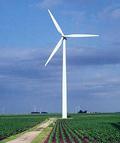 儘管愛荷華州人在乎環境和全球暖化的問題,但是他們節省能源的頭號理由就是省錢,2008年首次在安荷華州舉行的能源調查這樣指出,這個調查由北愛荷華州大學策略行銷服務部所執行,經費由愛荷華能源基金所資助。
儘管愛荷華州人在乎環境和全球暖化的問題,但是他們節省能源的頭號理由就是省錢,2008年首次在安荷華州舉行的能源調查這樣指出,這個調查由北愛荷華州大學策略行銷服務部所執行,經費由愛荷華能源基金所資助。
這個調查發現,買車決策、少開車、在家裝起可使用再生能源的裝置,這些決定的主要因素就是想要省錢。
愛荷華能源調查由三個不同的測驗組成,概括性質的能源問卷、和交通運輸有關的問卷以及一個居家有關的問俊,在2008年11月的第一週發出各一萬份。
策略行銷服務部回收到1484份完整的交通運輸問卷,1215份居家問卷和1054份概括的能源問卷,調查的結果於2月24日公布。
從問卷的回答中顯示了愛荷華能源使用者擔憂他們的利益沒有被適當地保護,而92%則擔心該州未來會面臨能源短缺的問題。
在州內發展新的或是可再生能源的選項被71%的回答者列為最能為愛荷華州長期能源需求帶來重大影響的措施,但是幾乎一半的回答者不願意為可再生能源付較高的費用。
比起「確保能源的可靠來源」和「保護環境、防制氣候變化」來,「確保能源價格越低越好」被視為更重要的優先項目。
交通運輸問卷表示70%的受訪者擁有2-3台汽車,幾乎2/3回答他們無法使用大眾運輸,大約80%的受訪者表示因為油價上漲而減少開車的次數,一半的受訪者對於共乘制表示沒有興趣。
大約47%的受訪者表示如果價格是一般車輛5%-10%,他們在未來三年不太可能購買油電混合或是電力的車種;45%有點可能購買,而9%表示非常可能購買。
幾乎所有的居家問卷的受訪者(97%)相信在家裡如果能有效率地使用能源,可以減少每月水電的支出。
93%願意多付10%的價格在高效能源使用的住家上,97.6%表示當他們重新裝潢時,會視能源的使用效率是設計的重點。
大部分的受訪者表示他們願意住在太陽能或是風力電廠附近,而不是核電廠或是燃煤電廠。
這個調查表示61.2%不願意居住在離核電廠10英哩之內,而55.4%不願意住在離燃煤電廠10英哩之內,但是受訪者卻表示他們偏好建更多的核電廠,而不是燃煤電廠。
「當談到確保本州正面的未來發展的首要之務時,能源問卷的受訪者表示教育第一、其次是經濟發展以及減少州政府的支出,」北愛荷華州大學策略行銷服務部主管帕達瑞許(Ron Padavich)說,「確保一個安全、乾淨的環境僅對少數人是重要的,但是對於這些少數來說,這卻是最首要的優先重點。」
Although Iowans are concerned about the environment and global warming, the number one reason they conserve energy is to save money, finds the first Iowa Energy Poll, 2008, conducted by the University of Northern Iowa's Strategic Marketing Services and funded by the Iowa Power Fund.
Vehicle purchases, driving less as gas prices increase, buying appliances and equipping a home with renewable energy sources are all influenced primarily by the wish to save money, the poll found.
The Iowa Energy Poll consisted of three different surveys a general energy survey, a transportation survey and a housing survey. Ten thousand of each were distributed the first week of November 2008.
Strategic Marketing Services received a total of 1,484 completed transportation surveys; 1,215 completed housing surveys; and 1,054 completed general surveys. The results of the poll were released today.
Respondents expressed concern that their best interests as Iowa energy users are not being adequately protected, and 92 percent are concerned that the state will face energy shortages in the future.
Developing new or alternative sources of energy within the state was selected by 71 percent as the one thing that will have the greatest impact on ensuring that Iowa's energy needs are met over the long term. Yet almost half of the respondents are unwilling to pay more for renewables.
Keeping energy costs as low as possible was ranked more important than ensuring reliable sources of energy and protecting the environment and preventing climate change.
The transportation survey showed that 70 percent of respondents have two to three on-road vehicles. Almost two-thirds reported that public transportation was not available to them. About 80 percent reported driving less as gas prices increased. Half of respondents were not interested in carpooling.
Roughly 47 percent said they were "not at all likely" to purchase a hybrid or electric vehicle in the next three years if the initial cost was five to 10 percent higher than a gasoline powered vehicle; 45 percent were somewhat likely; and nine percent were very likely.
Almost all housing survey respondents, 97 percent, believe that being more energy efficient in the home would reduce the amount paid for utilities each month.
Ninety-three percent would be willing to pay 10 percent more for a home with a high-energy efficiency rating, and 97.6 percent said energy efficiency was important when remodeling their homes.
Most respondents said they would be willing to live near solar and wind farms as compared to nuclear power plants and coal-fired power plants.
The survey shows that 61.2 percent are unwilling to live within 10 miles of a nuclear power plant, while 55.4 percent are unwilling to live within 10 miles of a coal-fired power plant. Yet respondents said they preferred to build more nuclear power plants than coal-fired power plants.
"When it comes to what issues must be addressed to ensure a positive future for the state, respondents of the general energy survey ranked education first, followed by economic development and reductions of state government spending," said Ron Padavich, director of UNI's Strategic Marketing Services. "Ensuring a safe, clean environment was important to fewer people, but for those few, it was the most important issue."
Click here to view the complete Iowa Energy Poll, 2008, Final Research & Analysis Report.





